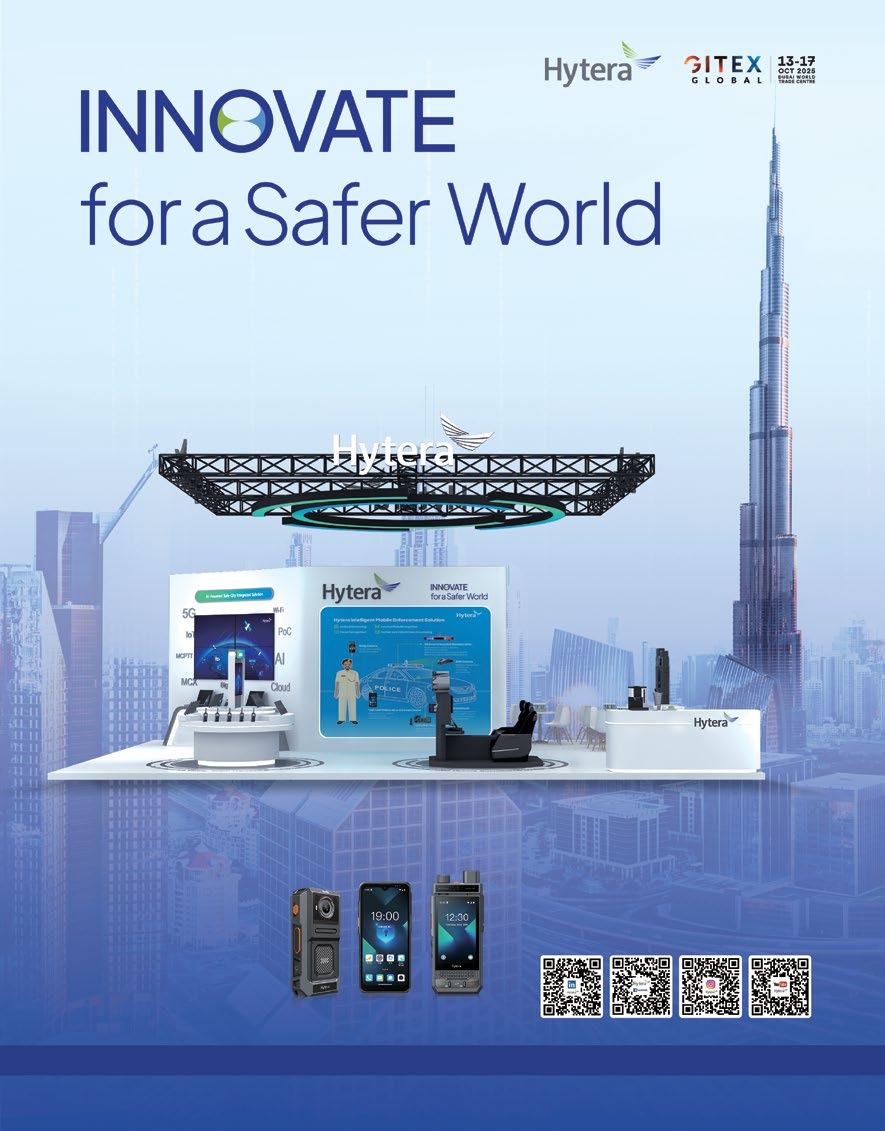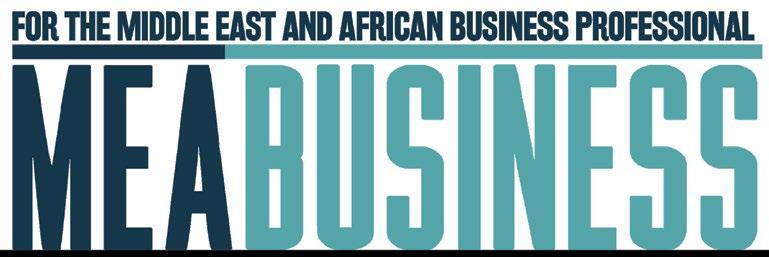
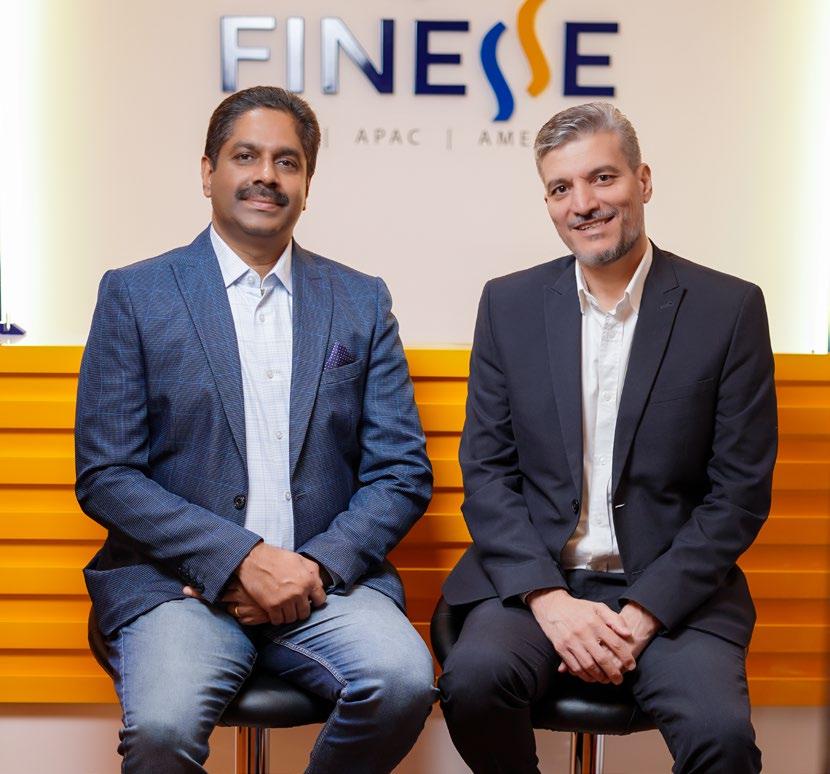








Explore how GBM is elevating payment security with innovative AI solutions Our advanced approach addresses modern fraud, boosts accuracy, and ensures secure, seamless transactions. Stay ahead of fraudsters and safeguard your payments with smarter, more resilient strategies.

Welcome to this special issue of MEA Business, dedicated to celebrating the MEA Business Achievement Awards. At MEA Business, we are committed to delivering comprehensive business news across the Middle East and Africa. Our mission is to provide a dynamic platform where business leaders can share ideas, engage in meaningful debates, and forge strategic partnerships that will shape the future of the region.
Our goal is to equip business leaders and professionals with the skills and insights they need to thrive in these dynamic regions. By focusing on positive news stories, detailed case studies, and inspiring interviews, we aim to foster a narrative of growth and success.
MEA Business magazine offers clear and concise information through various sections, including up-to-the-minute news, market updates, and exclusive CEO interviews. Our readers benefit from a comprehensive blend of our printed magazine, e-magazine, and social media content, providing coverage on the latest developments in the Middle East and Africa.
Additionally, MEA Business proudly features several sector specials throughout the year, tailored to coincide with major industry exhibitions and events.
We hope you find this issue both informative and inspiring.

Kenneth Mitchen Publisher, MEA Business
Kenneth Mitchen Publisher, MEA Business
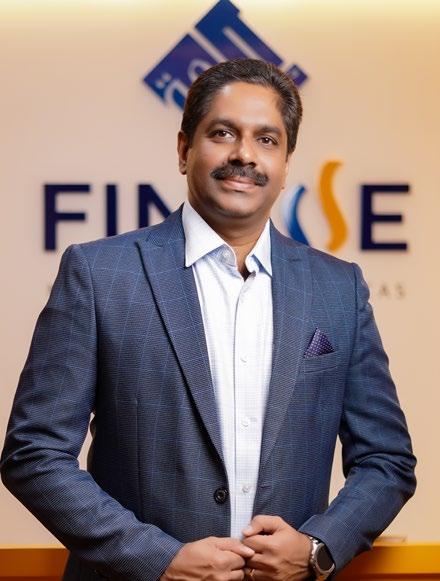
EMAIL: info@cme-media.com


EXECUTIVE
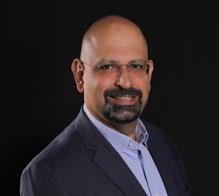


At GITEX GLOBAL, Cloudflare unveils its Connectivity Cloud, a unified, secure, and scalable platform powering the Middle East’s next era of digital innovation.
Cloudflare a leading connectivity cloud company, recently announced its participation at GITEX GLOBAL 2025, where it will put a spotlight on the world’s first Connectivity Cloud — its flagship solution that unifies security, performance, and developer services into a single, programmable platform. Designed to simplify operations, protect data, and enable organizations to scale globally, Cloudflare’s Connectivity Cloud offers a robust, secure AI application infrastructure via scalable cloud-native services, which eliminates the need for multiple vendors. It sits at the heart of Cloudflare’s vision to help enterprises and public sector organisations in the Middle East build fast, reliable, and AI-ready digital experiences.
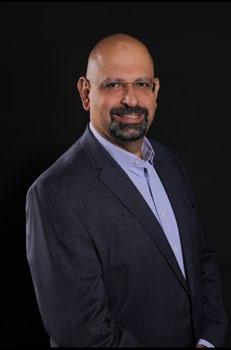
At GITEX, Cloudflare will demonstrate how the Connectivity Cloud integrates with a range of cutting-edge capabilities that address the most pressing needs of private and public organisations today. Visitors to Cloudflare’s stand will experience innovations across three key areas:
Secure Access Service Edge (SASE) and Security Service Edge (SSE)
• AI Crawler Control: Empowers organizations to manage which AI crawlers can access their content, blocking unauthorized scraping by default and introducing a potential “pay per crawl” model to monetize permitted access.
• Bot Management for Public Interest: Supports independent journalism and nonprofit organizations in defending against malicious bots and unauthorized AI scraping.
• Zero Trust Integrations with Microsoft Entra ID: Delivers stronger, identity-driven security controls to help enterprises reduce risk and improve compliance.
• DDoS Defense at Internet Scale: Demonstrates Cloudflare’s unmatched capability to automatically mitigate record-breaking, multi-terabit DDoS attacks.
Fast Application Delivery & Network Infrastructure
• Connectivity Cloud Core Capabilities: Unifies networking, security, and developer services in a single, programmable platform designed for AI-ready, global-scale applications.
• Workers VPC and Private Link: Provides secure, isolated environments enabling developers
to build and connect cross-cloud applications with top-tier performance and compliance.
• AI Insights via Cloudflare Radar: Offers real-time visibility into how AI models are crawling and consuming web content.
• Workers Developer Platform Enhancements: Allows organizations to rapidly build, deploy, and scale modern applications directly on Cloudflare’s edge network — now enhanced with AI integration.
Together, these solutions highlight how Cloudflare is enabling customers in the Middle East to secure, optimize, and monetize their digital ecosystems in an era where AI, security, and connectivity converge.
“Enterprises in the Middle East are rapidly scaling their digital ambitions, and they need platforms that can deliver security, performance, and innovation all at once. With our SASE and SSE solutions, we help organizations strengthen their security posture while keeping operations simple and efficient. Through our Connectivity Cloud, we provide the foundation for fast application delivery and resilient network infrastructure across the region. And with our full-stack developer platform, we empower innovators to build and scale applications closer to their users than ever before. GITEX GLOBAL is the perfect platform for us to showcase these capabilities and demonstrate how Cloudflare is enabling regional customers to confidently embrace the future of digital transformation,” said Bashar Bashaireh, AVP Middle East, Türkiye & North Africa at Cloudflare
New alliances with Forcepoint, Citrix, Ubiquity, Everfox and Eaton set to accelerate digital transformation across the region
Mindware, a leading value-added distributor (VAD) across the Middle East and Africa, has announced new strategic partnerships with global technology leaders Forcepoint, Citrix, Ubiquity, Everfox, and Eaton. Through these alliances, Mindware is expanding its presence in East Africa, bringing organizations access to advanced solutions in cybersecurity, digital workspaces, networking, and power management.
Since establishing operations in East Africa just six months ago, Mindware has tripled the number of vendors in its portfolio and doubled the number of active transacting partners, reflecting the rapid growth and demand for advanced IT capabilities in the region. To further accelerate adoption, the distributor is driving weekly training and enablement sessions to upskill partners and ensure they can deliver measurable value to customers.
Through these partnerships, Mindware is addressing the growing demand for advanced technology solutions across East Africa, helping enterprises and SMEs strengthen operational resilience, enhance connectivity, and accelerate digital transformation. Forcepoint will deliver cybersecurity technologies to protect organizations’ data and operations, while Citrix will provide secure digital workspaces and virtualization to support hybrid work models. Ubiquity will enhance enterprise and service provider networks with highperformance connectivity, and Everfox will bring advanced cybersecurity capabilities designed specifically for governments and critical infrastructure sectors. Eaton will complement the portfolio with robust power management and sustainabilitydriven energy efficiency solutions.
“These partnerships underscore Mindware’s commitment to bridging the gap between global innovation and local needs in East Africa,” said Spiros Rafailovits,
Territory Manager, East Africa at Mindware. “By bringing in leading vendors across multiple technology domains, we are empowering the IT channel ecosystem with the tools, training, and support needed to drive digital transformation. Our objective is to strengthen the resilience, efficiency, and competitiveness of organizations across Kenya, Uganda, Tanzania, Rwanda, and Ethiopia.”
To support these new alliances, Mindware will launch a series of initiatives including Mindware Connect roadshows, specialized partner enablement programs, training workshops, and certifications. These efforts are designed to upskill local partners, increase solution adoption,

These partnerships underscore Mindware’s commitment to bridging the gap between global innovation and local needs in East Africa.
andensure businesses can fully leverage these new technologies. The company has already initiated pilot projects in Kenya and Uganda, with early customer feedback highlighting strong demand for both cybersecurity and power management solutions.
This expansion is a cornerstone of Mindware’s broader African growth strategy. The company is focused on delivering end-to-end digital transformation through cloud, AI, and cybersecurity solutions, while also bridging the ICT
skills gap with training and certification programs. Mindware will provide financial assistance and credit facilities to support IT resellers and system integrators, while continuing to strengthen its supply chain to ensure fast and reliable delivery of solutions across the region. With its hub in Nairobi and active presence across East Africa, Mindware continues to establish itself as the region’s trusted distribution partner, enabling businesses to thrive in a secure, connected, and future-ready digital economy.
At GITEX, Veeam showcases its expanded Data Platform, Data Cloud, and new Data Resilience Maturity Model, empowering organizations to measure, strengthen, and achieve cyber resilience in an AI-driven world.
Veeam® Software, the global leader in Data Resilience, recently announced its participation at GITEX GLOBAL 2025, taking place from 13–17 October at the Dubai World Trade Centre. At this year’s event, Veeam will showcase how its expanded Veeam Data Platform, Veeam Data Cloud, and the new Data Resilience Maturity Model (DRMM) enable organizations to strengthen and measure resilience in the face of evolving cyberthreats.
“Organisations across the Middle East and Africa face mounting cyber risks, rapid multi-cloud adoption, and growing regulatory pressure around data sovereignty,” said Mena Migally, Regional VP – EMEA East, Veeam Software. “Resilience must be measurable, intelligent, and proactive. Our new DRMM provides enterprises with a framework to benchmark and strengthen their resilience posture, ensuring business continuity and brand trust.”
Veeam at GITEX 2025: Key Highlights
At Hall 7, Stand B20, Veeam will showcase the latest innovations through live demos, expert sessions, and partner showcases. Highlights include:
• Cyber Secure Program Enhancements: AI-driven malware detection, cleanroom recovery, and an expanded ransomware warranty, offering comprehensive protection from cyberattacks.
• Data Resilience Maturity Model (DRMM): A framework helping organizations assess and advance their resilience capabilities.
• Veeam Data Cloud: A unified Backupas-a-Service for Microsoft 365 and
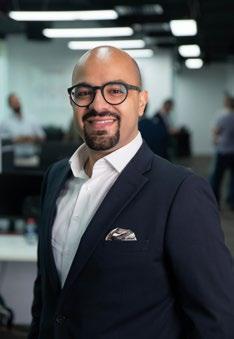
Azure, now available across key Middle East markets.
• Software Appliance Launch: A fully prebuilt, pre-hardened, hardwareagnostic appliance for simplified deployment and stronger resilience.
• Partner Ecosystem: Joint demos with technology leaders including ExaGrid, Red Hat, Object First, Alpha Data, and BPS, showcasing real-world applications of Veeam’s resilience framework.
Visitors can also explore tailored solutions under the themes of AI-Powered Data Protection, Ransomware-Proofing, Data Sovereignty, and Zero-Trust Resilience.
As part of the GITEX conference
programme, Tim Pfaelzer, GM & SVP, EMEA, Veeam, will deliver a keynote titled “Enterprise Resilience Redefined: Securing Data in a Threat-Filled World,” focusing on adaptive resilience powered by AI and automation.
Veeam continues to accelerate its growth across the Middle East and Africa, with major customer wins in financial services, government, healthcare, and education— including Batterjee Medical College, The Coca-Cola Bottling Company of Saudi Arabia, and KPMG Lower Gulf. The company recently established a new legal entity in Saudi Arabia, reinforcing its longterm commitment to regional investment and customer success.
Veeam has also been recognised as the #1 provider of Microsoft 365 and Kubernetes data protection, continuing to grow its annual recurring revenue and customer base year on year.
Reaffirming its “Together, We Build Resilience” message, Veeam will highlight its channel-first strategy, offering partners co-marketing, joint demos, and customer engagement opportunities. Expanded distributor collaborations and new training initiatives across the Middle East and Africa aim to equip partners to thrive in multi-vendor cloud environments.
Aligned with industry priorities, Veeam will also spotlight its global sustainability and diversity programmes, designed to foster a greener, more inclusive digital future.


The fintech powerhouse was recognised for Best Mobile Payment App, while CEO Melike Kara was honoured as the Payments Technology Executive of the Year, cementing their leadership in the region’s digital finance revolution.
In a significant acknowledgment of its industry leadership and innovation, e& money has achieved a remarkable dual success at the prestigious MEA Finance Leaders in Payments Awards 2025. The fintech arm of e& life was honoured with two of the evening’s top accolades, celebrating both its exceptional service and visionary leadership. The first award recognised e& money as the “Best Mobile Payment App,” a testament to its success in creating a comprehensive and user-centric financial super app. The platform has become an indispensable tool for millions in the UAE, offering a seamless and secure ecosystem for everything from international remittances and bill payments to merchant transactions. This award highlights the app’s role in driving the UAE’s transition towards a cashless economy by providing an intuitive and powerful platform that simplifies the daily financial lives of its users.
The second honour of the night was awarded to Melike Kara, Chief Executive Officer at e& money, who was named the ‘Payments Technology Executive of the Year in Financial Services’. This prestigious individual award celebrates her outstanding contribution to the fintech landscape. Joining the company in 2021, Kara has been the driving force behind the platform’s

Melike Kara, Chief Executive Officer at e& money
strategic transformation and regional expansion.
Under her stewardship, e& money has aggressively pursued its vision of becoming the region’s leading financial super app. Her leadership has been instrumental in steering the organisation through a period of remarkable growth, skillfully leveraging both organic and inorganic initiatives to enhance the platform’s capabilities and market reach. With deep expertise in the payments and digital banking sectors, Kara has successfully translated a bold vision into tangible
results, solidifying e& money’s position as a dominant force in the competitive fintech arena.
The company’s focus extends beyond technology into partnerships and ecosystem development. By collaborating with merchants, banks, and regulators, e& money ensures solutions are widely adopted and seamlessly integrated across the region. Initiatives such as loyalty programs, AI-driven personalization, and financial education tools reinforce its commitment to delivering value to both consumers and businesses. As the UAE and wider Middle East continue to embrace digital financial services, e& money’s dual recognition demonstrates how a customer-first approach and innovative technology are redefining the payments landscape.
The MEA Finance Leaders in Payments Awards brings together industry pioneers to recognise organisations and individuals driving transformation across the Middle East’s rapidly evolving payments ecosystem. This year’s awards highlighted outstanding achievements across banks, fintechs, and technology partners, reflecting the region’s growing focus on innovation, digital transformation, and financial inclusion.
For the good times and the bad.
For the unexpected and the planned - we’re here for you.
Because Shari’a-inspired banking is transparent and fair by design.
Our kind of banking simplifies lives. Making goals easier to achieve. Built around mutual trust and mutual benefit. Which means that it’s good for you – and good for us.
So here is our simple promise to you:
We’ll make a lifelong commitment to partner with you. A partnership built upon the values of honesty and fairness. We’ll put you at ease, listen – and lead. And we’ll provide you with hospitable banking that helps you succeed.
Because life is to be lived. So welcome to ADIB – your lifelong partner.
At the forefront of digital transformation in the Middle East, Finesse is helping organizations turn AI innovation into real business value. In this exclusive Q&A, Eljo J P, CBO & Director, Samer Dlikan CTO & Director and Pradeep Krishnan, VP IT security, reveal how Finesse is moving AI from hype to strategy, the critical role of data governance, and what businesses can expect from their cutting-edge solutions at GITEX 2025.
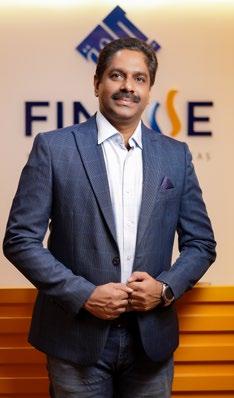
Transformation Solutions: Advising, Enabling, and Securing” at GITEX 2025, emphasizing a strategic, AI-centric approach.
In its 1CXO Advising pillar, Finesse will guide organizations beyond the hype of Generative AI, focusing on achieving strategic value through tailored AI roadmaps and addressing the critical prerequisite of a coherent data strategy with robust governance for successful implementation. We provide advisory services in areas such as Environmental, Social, Governance (ESG), Customer Experience, Digital Transformation, Corporate Services, Information Management, Data Privacy, and Information Security.
business ecosystems by 2026, enabling predictive adaptation.
For Securing, Finesse will emphasize its Cyberhub 24/7 CSOC services and a “Security and Ethics by Design” approach for AI. This includes addressing crucial challenges like AI model security, data privacy, ethical AI, and regulatory compliance to ensure responsible innovation and mitigate significant risks. Our Cybersecurity solutions provided by Finesse include including Cloud and Application Assurance, Compliance and Digital Risk Management, Zero Trust Security frameworks, Digital Identity Management, Managed Security Services, Multifactor Authentication, IAM, SIEM, SOAR, PAM, IAM , Threat Intelligence, Threat Hunting , Incident response services and VAPT, Red Teaming, SOC solutions.
How do you see AI shaping the future of business operations in the region over the next five years?
Over the next five years, AI will move from proof-of-concept to the engine room of business operations in the Middle East. Driven by bold government visions like UAE National AI Strategy, organizations will harness AI to predict, optimize, and adapt in real time—transforming efficiency, agility, and customer value.
End-to-end automation will see supply chains self-manage, factories adapt production instantly, and services become hyper-personalized. AI combined with IoT, 5G, and edge computing will power instant, data-driven decisions for industries from energy and logistics to healthcare and retail. Cyber resilience will also leap forward, as AI-enabled SOCs detect and neutralize threats before they disrupt operations.
But success will hinge on two things: data readiness—unlocking unified, trusted data—and responsible AI governance that ensures compliance, ethics, and transparency. The businesses that get this right won’t just be more efficient— they will create entirely new business models and shape the region as a global hub for AI innovation.
Everyone is talking about Generative AI. How can businesses move beyond the hype and chatbot experiments to achieve real, strategic value?
While initial Generative AI excitement What will Finesse showcase at GITEX 2025?
Finesse will showcase its “Holistic Digital
The Enabling pillar will highlight technology implementation and integration, prominently featuring AI solutions Our portfolio of solutions includes AI Chatbots, BI & Analytics, ECM (Enterprise Content Management), CPM(Corporate Performance Management), CRM (Customer Relationship Management), RPA (Robotic Process Automation), HCM (Human Capital Management), Corporate Treasury Management. Finesse will also showcase the future convergence of AI with edge computing and autonomous systems, leading to AI-orchestrated hyper-automation and self-optimizing
has centered on accessible tools like chatbots, true strategic value emerges from transforming core business operations. Organizations must shift from isolated experiments to systemic, value-driven applications that deliver measurable ROI.
Success requires treating AI as a business enabler with robust governance and security frameworks. Finesse’s 1CXO advisory services exemplify this strategic approach by helping organizations develop tailored AI roadmaps that address specific business challenges rather than chasing technology trends. Organizations should focus on measurable outcomes such as operational efficiency, customer experience enhancement, and competitive advantage creation. By embedding AI into comprehensive digital transformation strategies, businesses achieve lasting value rather than temporary technological novelty.
With the explosion of AI, what is the single most overlooked prerequisite for a successful implementation that leaders often miss?
The most critical, and most frequently underestimated, prerequisite for successful AI is a modern and coherent data strategy. While leaders focus on sophisticated algorithms, AI is only as effective as the underlying data quality. Many organizations possess vast data repositories trapped in departmental silos with poor governance structures—a fundamental recipe for failure resulting in inaccurate insights and biased outcomes.
Before significant AI investments, leaders must prioritize comprehensive data governance. Finesse’s 1CXO advisory services champion a “data-first” culture, helping clients build foundational data platforms and governance frameworks essential for generating reliable, secure business value from AI investments. This involves establishing clear data ownership, breaking down organizational silos, creating unified data sources, and ensuring robust security and privacy compliance from implementation. Beyond efficiency, what are the most significant tangible business outcomes companies can expect from a well-executed digital transformation and AI strategy?
While efficiency gains and cost savings are immediate benefits, the most transformative and durable outcomes of a well-executed strategy are centered on sustainable growth and enhanced organizational resilience. Organizations become more intelligent, predictive, and adaptive rather than simply faster.
Two significant outcomes emerge consistently: Radical Customer Experience Transformation goes beyond functional improvements to deliver proactive, predictive, hyper-personalized engagement across all touchpoints, building unbreakable customer loyalty and unlocking new revenue streams.
Resilient Operational Intelligence enables real-time anticipation and adaptation to market shifts, supply chain disruptions, and changing customer behaviors . Finesse partners with organizations to achieve these strategic outcomes, ensuring digital transformation delivers boardroom-level value that creates lasting competitive advantages.
As businesses adopt AI more deeply, what are the critical security and governance challenges they must address to avoid significant risks?
Integrating AI deeply into core operations introduces a new dimension of complex security and governance challenges that go far beyond traditional cybersecurity. While AI offers immense potential, it also presents unique risks that leaders must vigilantly address. With the average cost of a data breach reaching $4.35 million globally, robust AI security becomes essential for business continuity.
Critical challenges include:
Model Security, where AI models themselves can be attacked through methods like “data poisoning” or adversarial inputs to corrupt their output and decisions.
Another is Data Privacy and Confidentiality, as powerful Generative AI models can inadvertently expose sensitive personal or proprietary information used in their training data, making robust data anonymization and privacy frameworks non-negotiable. Furthermore, Ethical AI and Algorithmic Bias is a major concern; an AI model trained on biased data can perpetuate and amplify discriminatory outcomes, leading to significant reputational
damage and legal liabilities. Finally, navigating the complex and evolving global Regulatory Compliance landscape for AI is a critical board-level responsibility.
To mitigate these risks, Finesse’s integrated 1CXO advisory and Cyberhub 24*7 CSOC security services champion a “Security and Ethics by Design” approach, embedding governance, transparency, and robust security into the AI lifecycle from the very beginning to build trust and ensure responsible innovation.
What’s the biggest shift businesses will see in digital transformation by 2026?
The most significant shift will be the convergence of AI, edge computing, and autonomous systems creating selfoptimizing business ecosystems. Going forward, organizations will transition from reactive digital strategies to predictive, autonomous operations where AI systems continuously optimize processes, predict market changes, and adapt business models in realtime without human intervention. This represents a fundamental evolution from project-based transformation to continuous digital adaptation.
Hyper-automation will become mainstream, with AI orchestrating entire value chains from supply management to customer delivery . Quantum computing will revolutionize data processing while edge computing enables unprecedented real-time decision-making. Organizations will embrace continuous digital evolution where technology adaptation becomes an ongoing capability rather than periodic initiatives. Finesse is actively preparing through expanded AI, cloud computing, cybersecurity, and data analytics portfolios, while our threepillar approach—1CXO advisory, enabling solutions, and Cyberhub 24/7 CSOC security—ensures seamless transitions to autonomous, predictive operation
What is the future of AI in data management and analysis, and how will it transform the field in the next 5 years?
Over the next five years, AI will transition from a set of specialized tools to become the central nervous system of data operations, fundamentally altering
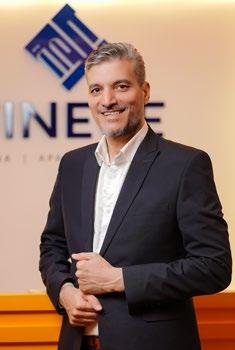
Samer Dlikan, CTO & Director of Finesse
how organizations collect, process, and utilize information.
This transformation will enable everything from automated data pipeline creation and intelligent data governance to predictive analytics driving strategic decision-making. We will witness the rise of self-managing data platforms, powered by AI, that optimize performance and automatically address issues. Generative AI will revolutionize data augmentation, creating synthetic datasets for model training and simulations.
The key to realizing this potential lies in establishing a robust data-centric culture. Organizations must prioritize data literacy across all levels, invest in AI-powered data infrastructure, and embrace ethical AI practices. Successfully navigating the complexities of data privacy, security, and bias mitigation will be crucial for maintaining trust and gaining a competitive edge.
What are the potential risks and challenges associated with deploying AI in data management, and how can organizations effectively mitigate them?
While the promise of AI in data is
immense, its implementation presents significant operational, ethical, and technical challenges. Key risks include data quality issues, which can severely compromise model accuracy and reliability, and security vulnerabilities that can lead to data breaches and misuse. The potential for algorithmic bias, stemming from flawed training data or model design, can result in unfair or discriminatory outcomes.
We advise a comprehensive mitigation strategy. It begins with a strong commitment to data governance, including data quality monitoring, data lineage tracking, and access controls. Organizations must also adopt a “Security and Ethics by Design” approach, embedding safeguards and bias detection mechanisms into every stage of the AI lifecycle. This is further reinforced by continuous monitoring, independent audits, and a culture of transparency—all essential for fostering trust and ensuring responsible AI adoption.
In what ways can AI-driven real-time analytics improve fraud detection accuracy while minimizing false positives in high-volume financial transactions?
AI-driven analytics represents a paradigm shift from static, rule-based fraud detection. Machine learning algorithms can analyze millions of data points per second to identify subtle, anomalous patterns that indicate sophisticated fraud—patterns that legacy systems would miss. By training on vast historical datasets, these models learn to distinguish between legitimate and fraudulent activity with exceptional precision.
The key is AI’s ability to improve accuracy while simultaneously minimizing disruptive false positives. This is achieved in three ways. First, it integrates rich contextual data—like transaction history, device biometrics, and geolocation—to assess risk holistically. Second, adaptive algorithms enable the system to learn continuously from real-time feedback, refining its understanding of new fraud tactics and normal customer behavior. Finally, employing ensemble methods leverages the strengths of multiple models for more nuanced decisionmaking. The result is a dynamic, self-
improving defense that maximizes detection rates while minimizing friction for genuine customers.
How do you see AI shaping the future of business operations in the Middle East over the next five years?
Over the next five years, AI will move from proof-of-concept to the engine room of business operations in the Middle East. Driven by bold government visions like UAE National AI Strategy, organizations will harness AI to predict, optimize, and adapt in real time—transforming efficiency, agility, and customer value.
End-to-end automation will see supply chains self-manage, factories adapt production instantly, and services become hyper-personalized. AI combined with IoT, 5G, and edge computing will power instant, data-driven decisions for industries from energy and logistics to healthcare and retail. Cyber resilience will also leap forward, as AI-enabled SOCs detect and neutralize threats before they disrupt operations.
But success will hinge on two things: data readiness—unlocking unified, trusted data—and responsible AI governance that ensures compliance, ethics, and transparency. The businesses that get this right won’t just be more efficient— they will create entirely new business models and shape the Middle East as a global hub for AI innovation.
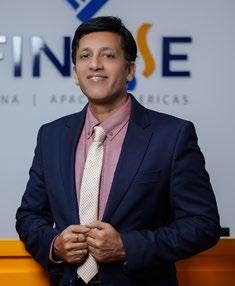
What are some of the most pressing cybersecurity challenges your team is observing in 2025, and how are your SOC capabilities helping clients address them?
In 2025, the most pressing cybersecurity challenges include increasingly sophisticated attacks, the rise of insider threats, and the rapid evolution of cyber threats. Finesse’s Cyberhub 24/7 Cognitive Security Operations Center (CSOC) addresses these challenges through advanced AI and automation capabilities, ensuring real-time threat detection, accelerated response, and enhanced cyber resilience.
Cyberhub 24/7 CSOC leverages AI-powered threat detection and predictive analytics to identify complex attack patterns and anticipate future threats, reducing the Mean Time To Detect (MTTD) by 50%. User and Entity Behavior Analytics (UEBA) detects insider threats by analyzing user behavior for anomalies. Security Orchestration, Automation, and external Response (SOAR) platforms initiate immediate, predefined responses, minimizing attack impact and enabling experts to focus on strategic threat hunting.
The integration of SIEM, SOAR, and UEBA technologies shifts operations from reactive to proactive, building an adaptive defense against evolving threats. This approach ensures robust protection, enabling enterprises to innovate confidently while managing risks effectively.
What role does AI and automation play in your SOC operations, and how does it enhance detection, response, and overall cyber resilience?
AI and automation are integral to Finesse’s Cognitive Security Operations Center (CSOC), transforming cybersecurity into a proactive and adaptive function. These technologies enhance detection by analyzing vast data volumes in real time, reducing the Mean Time To Detect (MTTD) by 50% and identifying insider threats through User and Entity Behavior Analytics (UEBA). Automated response mechanisms, powered by Security Orchestration, Automation, and Response (SOAR), initiate immediate actions like isolating devices or blocking malicious IPs, minimizing attack impact.
This integration of AI-driven analytics, automation, and behavioral analysis strengthens cyber resilience by shifting operations from reactive to proactive, anticipating threats, and building an adaptive defense against sophisticated attacks.
With security, compliance, and trust under growing scrutiny, how do you help enterprises innovate confidently while managing risk and responsibility?
Finesse empowers confident enterprise innovation by integrating risk management( in AI age), security, and compliance into their transformation strategy from the start, guided by a “Security and Ethics by Design” philosophy. Our holistic “Advising, Enabling, and Securing” framework ensures accountability and trust throughout the process.
The journey begins with our 1CXO advisory services, where we collaborate with leadership to create transformation roadmaps that prioritize governance and security. This proactive approach addresses risks associated with emerging technologies like AI, such as data privacy, algorithmic bias, and regulatory compliance.
Our technology teams then execute the strategy, supported by the Cyberhub 24/7 Cognitive Security Operations Center (CSOC). We employ a proactive, data-centric posture built on a Zero Trust architecture, combined with AI-powered threat detection and continuous monitoring to protect the digital ecosystem from evolving threats. Our focus in OT security ensures everything is monitored and redirected.
By unifying strategy, execution, and security under a single partner, we eliminate gaps and fragmented visions that often result from managing multiple vendors. This cohesive approach provides a resilient governance framework, enabling businesses to innovate with speed and confidence while fostering lasting trust with stakeholders.
How does Finesse ensure that its cybersecurity services remain compliant with regional regulations, such as the UAE’s and GCC’s growing data protection mandates?
Finesse ensures its cybersecurity services remain compliant with the UAE’s and GCC’s growing data protection mandates through a comprehensive, multi-layered strategy that combines local infrastructure, specialized advisory, and robust technical controls. This approach is designed to address the specific regulatory nuances of the region.
A cornerstone of this strategy is Finesse’s local presence. By operating state-of-the-art Cyberhub 24/7 Cognitive Security Operations Centers (CSOC) in the UAE, Finesse directly addresses critical data residency and sovereignty laws. These regulations often require that sensitive data be processed and stored within national borders. This local infrastructure provides clients with the assurance that their data is managed in strict accordance with regional mandates, forming the foundational layer of compliance. We respect data sovereignty of clients and national regulations.
This is complemented by dedicated advisory and risk management services. Finesse offers a “Digital Risk & Compliance” service line that helps organizations navigate the complex regulatory landscape. This involves conducting thorough assessments to identify and close gaps between current security practices and the requirements of laws like the UAE’s Personal Data Protection Law (PDPL) and international standards like GDPR. Through its proactive 1CXO advisory services, Finesse also embeds data privacy and compliance into the very fabric of a client’s digital transformation strategy, ensuring security is a core component from the outset, not an afterthought.
This strategic framework is underpinned by a suite of robust technical solutions. Finesse implements essential controls such as end-to-end data encryption, data masking, and strict access management to protect information throughout its lifecycle. Furthermore, advanced solutions like Data Leakage Protection (DLP) are deployed to actively monitor and prevent the unauthorized exfiltration of sensitive data, providing a critical technical safeguard that enforces compliance at the operational level.
The industrial sprawl of Abu Dhabi’s Musaffah district isn’t known for glamorous events, but on a recent bright morning, an opening ceremony took place. Apave Group had gathered business leaders, engineers, and government officials to unveil its newest testing laboratory—a facility that represents far more than just another corporate expansion.
Walking through the lab’s gleaming corridors, past equipment designed to test everything from concrete strength to air quality, visitors got their first glimpse of what Apave CEO Philippe Maillard calls “removing uncertainty from an increasingly complex world.” It’s an ambitious mission statement, but then again, Maillard has reason to be confident. His company has been in the business of testing, inspection, and certification for over 150 years.
Apave Group strengthens its presence in the Middle East with a new Abu Dhabi testing laboratory designed to advance safety, quality, and sustainability. In this feature, Oscar Wendel, Editor-at-Large at MEA Finance, explores how Apave’s commitment to precision, local expertise, and integrity is building trust across the region’s fast-growing industries. testing.”
“We live in a world where we don’t like uncertainty,” Maillard explains, settling into a chair overlooking the bustling facility. “People want reassurance— that their office building won’t collapse, that their drinking water is safe, that industrial equipment won’t harm workers. What we do is provide that peace of mind through rigorous
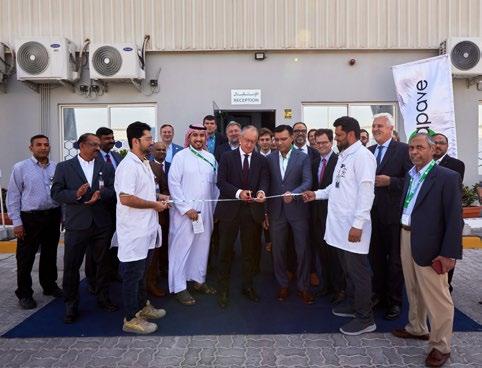
The timing of this Abu Dhabi launch isn’t coincidental. Apave has watched the Middle East transform into one of its most promising markets, and the numbers tell the story. Through its acquisition of Dubai-based Lonestar Technical Services, the French company has gone from having virtually no regional presence to employing 600 people in the UAE alone. Add another 250 in Oman and 150 in Saudi Arabia, and you’re looking at a regional workforce that has

Philippe Maillard, CEO of Apave
mushroomed in just a few years.
“The growth has been remarkable,” Maillard admits. “We keep hiring, keep expanding our capabilities. Frankly, it’s hard to keep up with the demand.”
That demand stems from the Gulf’s
construction boom, as well as from something less tangible—a maturing understanding of risk management. As Maillard puts it, when regions develop rapidly, the need for safety standards inevitably follows. Sometimes it takes an accident to focus minds; other
We live in a world where we don’t like uncertainty. People want reassurance— that their office building won’t collapse, that their drinking water is safe, that industrial equipment won’t harm workers. What we do is provide that peace of mind through rigorous testing.
— Philippe Maillard, CEO of Apave
times, regulators simply recognize that consistent standards benefit everyone.
The Human Element in a Tech-Heavy Industry
Despite operating across 60
countries, Apave’s philosophy remains stubbornly local. Yes, the company benefits from global knowledgesharing and standardized practices. Still, the actual work of testing concrete samples, inspecting building sites, and monitoring environmental conditions happens through local teams who understand regional regulations and cultural contexts.
“We’re not in the business of shipping French inspectors around the world,” Maillard says with a slight smile. “Our strength lies in hiring local experts and giving them world-class training and equipment.”
That equipment, he’s quick to note, isn’t proprietary. Apave buys the same testing machines available to competitors. The differentiator is human expertise, keeping technicians current with evolving technology, from drone-based inspections to AI-powered analysis tools. This focus on people over gadgets reflects a more profound truth about the testing industry: ultimately, it’s about judgment calls made by experienced professionals. A machine can measure concrete density, but it takes a trained eye to spot potential problems and communicate them effectively to clients.
No aspect of Apave’s work is more delicate than delivering bad news. When test results show that materials don’t meet specifications or that environmental conditions pose risks, someone has to have difficult conversations with clients who may have invested heavily in compromised projects.
“The worst thing we can do is issue a false report,” Maillard states flatly. “When we encounter companies cutting corners, skipping training, using substandard materials, and rushing processes, we walk away.
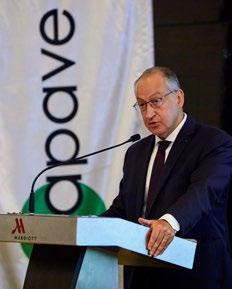
Our reputation depends on telling the truth, even when clients don’t want to hear it.”
This uncompromising stance occasionally costs business, but Maillard argues it’s essential to the company’s long-term credibility. If an Apave inspector flags concrete that won’t meet load requirements, that uncomfortable conversation might prevent a building collapse years down the line.
The responsibility weighs on the company’s thousands of employees worldwide and this is something they take pride in, according to Maillard. They’re not just running tests; they’re contributing to public safety in ways that aren’t always visible but are critically important.
Apave’s expertise has increasingly caught the attention of government regulators. In Saudi Arabia, authorities recently sought the company’s input on new safety legislation—a recognition that private sector experience can inform public policy.
“When you’ve established credibility in a market, regulators want to tap that knowledge,” Maillard explains. This
advisory role becomes particularly valuable in fast-developing regions where regulatory frameworks are still evolving to match the pace of construction and industrial growth.
The relationship works both ways. Apave benefits from understanding regulatory trends early, while governments gain access to practical insights from companies that deal with safety challenges daily.
The new Abu Dhabi laboratory, with its comprehensive testing capabilities spanning construction materials to environmental monitoring, signals Apave’s long-term commitment to the Middle East. But it also reflects the company’s broader approach: combining global credibility with local delivery, technical expertise with practical impact.
Standing in the facility’s main testing hall, watching technicians calibrate equipment and prepare samples, the human dimension of this hightech industry becomes clear. Behind every test result, every inspection report, every safety certification, are professionals who understand that their work contributes to something larger than quarterly earnings.
“We’re one piece in a much bigger puzzle,” Maillard reflects. “Maybe not the most visible piece, but an important one. Our people know that what they do today might prevent accidents, protect health, or ensure that buildings last for generations. That’s worth taking pride in.”
As the Gulf continues its ambitious development trajectory, companies like Apave provide an essential but often overlooked service: ensuring that rapid growth doesn’t come at the expense of safety and quality. In a region building for the future, that’s a responsibility as fundamental as any foundation.




A dynamic Q4 calendar showcases DWTC’s role in driving innovation, global collaboration, and Dubai’s status as a top destination for exhibitions and conferences.
As Dubai gears up for one of its most dynamic events seasons, the Dubai World Trade Centre (DWTC) is once again reinforcing the city’s status as a DWTC Unveils Major Q4 2025 Events Lineup leading global hub for events and business tourism. For the final quarter of 2025, DWTC has announced a packed schedule of major exhibitions, flagship conferences, and industry-defining gatherings. Spanning sectors such as technology, sustainability, healthcare, food and beverage, energy, construction, transport, finance, and education, this diverse Q4 calendar highlights DWTC’s central role in fostering innovation, driving commerce, and facilitating international collaboration.
Mahir Julfar, Executive Vice President at DWTC said: “Building on our strong performance in the first half of the year, we will continue to attract international event organisers, exhibitors, and visitors, along with globally renowned events across both established and high-growth industries in the second half of 2025. The upcoming line-up of flagship events such as GITEX Global, WETEX and Big 5 Global, showcase our ability to convene the world’s most influential leaders, innovators, speakers, and key players to shape the future of the MICE industry,”
“Through this dynamic calendar, we are reinforcing Dubai’s role as a catalyst for global commerce while advancing the ambitions of the Dubai Economic Agenda (D33) to position Dubai among the top three economic cities in the world.” Concluded Julfar.
October Events Calendar

November starts with Gulfood Manufacturing (4–6 November), the region’s leading F&B processing showcase. This is followed by GESS – Global Educational Supplies & Solutions, and Paperworld Middle East & Gift & Lifestyle Middle East (both 11–13 November) alongside World Tobacco (1112 November). The month also features ICOM 25 – 27th International Council of Museums (11–17 November) and The Mining Show (17–18 November), alongside Middle East Organic and Natural Products Expo, International Apparels and Textile Fair (both 17-19 November), Vision Plus Expo (17-18 November), and Food Safety Conference 2025 (18-19 November). The building and construction sector rounds out the month with Big 5 Global 2025, Windows Doors & Facades, GeoWorld, HVACR World, and LiveableCitiesX and Future FM (all 24–27 November).
In December, DWTC will host the 19th World Congress of Neurosurgery (1–5 December) and Automechanika Dubai (9–11 December), the region’s largest automotive aftermarket event. A cluster of trade shows closes the season, including Asia Baby Children Maternity Exhibition, China Home Life, and International Appliance and Electronics Show (all 17-19 December), before Jewellery & Bride Arabia (18–21 December) ends the DWTC 2025 events calendar
October kicks off with the World Green Economy Summit (1–2 October) and education and training event, Najah Exhibition (5–7 October). Accessibility, agriculture, and finance feature with AccessAbilities Expo (6-8 October), AGRA Middle East and The Forex Expo (both 6–7 October). Technology takes over mid-month with return of megaevent GITEX Global (13–17 October), the world’s largest tech event, showcasing innovation across AI, fintech, health tech, and smart cities. For the latter half of the month, the focus moves to healthcare and HR, with The International Family Medicine Conference and Exhibition, Annual Radiology Meeting (ARM 2025) and Healthcare Future Summit 2025 (all 21–23 October), and HR Summit 2025 (21-22 October), with the month’s line-up culminating in the beauty and wellness showcase, BeautyWorld Middle East and Wellness & Spa Exhibition (27–29 October).

Legacy revenue management is an iceberg, hiding significant lost revenue and engagement under the surface. With the Finacle Revenue Management Hub your bank can harness Next-Gen charging, billing and collections capabilities at an enterprise level, right Now.
Break the ice!
Flight Information Display System (FIDS) Ground-breaking products/services (Achievement Award) TAV TECHNOLOGIES
Hardware Exceptional Products/Services (Achievement Award) ScreenCheck
Hardware Ground-breaking products/services (Achievement Award) Plantaform Technology Inc.
Hardware Innovative Collaborations and Partnerships (Achievement Award) haifin
Open Nomination Award (Value Added Distributor) Outstanding sector leadership and growth (Achievement Award) MINDWARE
Open Nomination Award Exceptional Products/Services (Achievement Award)
Property Finder
Open Nomination Award Innovative Collaborations and Partnerships (Achievement Award) Hala (RTA Careem LLC)
Open Nomination Award (MEA cloud solutions) Outstanding sector leadership and growth (Achievement Award) Future Cloud Technologies Solutions Est
Open Nomination Award (Protech) Outstanding sector leadership and growth (Achievement Award) Property Finder
Satellite Communications Exceptional Products/Services (Achievement Award) Eutelsat
Sector Based Technology ESG Excellence (Achievement Award) DesiCrew Solutions Private Limited
Sector Based Technology New Technology (Achievement Award) Hlthera
Sector Based Technology Customer Experience - CX Excellence (Achievement Award) Hala (RTA Careem LLC)
Security and Access Control Exceptional Products/Services (Achievement Award) ScreenCheck
Security and Cyber Security Exceptional Leadership - (Personal Achievement Awards) Naji Salameh, Founder and CEO ,IT Max Global
Security and Cyber Security Exceptional Products/Services (Achievement Award) Veeam Software
Security and Cyber Security Ground-breaking products/services (Achievement Award) Cloudflare
Security and Cyber Security New Product/Service launch (Achievement Award) Black Cell Middle East LLC.
Security and Cyber Security New Technology (Achievement Award) Black Cell Middle East LLC.
Security and Cyber Security Outstanding sector leadership and growth (Achievement Award) Infoblox
Smart Cities Exceptional Leadership - (Personal Achievement Awards) Talal Debs, Co-founder, Syncrow - Dubai
Smart Cities Exceptional Products/Services (Achievement Award) Syncrow
Smart Cities New Product/Service launch (Achievement Award) Plantaform Technology Inc.
Software ESG Excellence (Achievement Award) Tarjama
Software Exceptional Leadership - (Personal Achievement Awards) Kishan Mulji Bhalsod, Founder, Future Cloud Technology Solutions EST
Software Exceptional Products/Services (Achievements Award) stc Bahrain
Software Ground-breaking products/services (Achievement Award) Infoblox
Software Innovative Collaborations and Partnerships (Achievement Award) Future Cloud Technologies Solutions Est
Software New Product/Service Launch (Achievement Award) PlanRadar
Software New Technology (Achievement Award) MAXimuz Technology
Software Outstanding sector leadership and growth (Achievement Award) Veeam Software
Software Outstanding Sustainability Initiative (Achievement Award) DesiCrew Solutions Private Limited
Software Customer Experience - CX Excellence (Achievement Award) Thomson Reuters
Technology Customer Experience - CX Excellence (Achievement Award) Omantel
Technology New Product/Service Launch (Achievement Award) MEWS
Technology Visionary Leadership Award (Personal Achievement Award) Abdumalik Mirakhmedov, Co-founder and Director, Scalo Technologies
Telecoms ESG Excellence (Achievement Award) Beyon
Telecoms Exceptional Products/Services (Achievement Award) Nexign Converged Charging
Telecoms Innovative Collaborations and Partnerships (Achievement Award) Ericsson
Telecoms New Product/Service launch (Achievement Award) Batelco by Beyon
Telecoms Outstanding sector leadership and growth (Achievement Award) Omantel
Telecoms Sheikh Talal Al Mamari, CEO of Omantel - Lifetime Achievement Award Omantel
George Hojeige Group CEO at Virtugroup shows how the global landscape of wealth distribution is undergoing a fundamental shift, with the United Arab Emirates emerging as the dominant recipient of capital flight from traditional financial centers
Recent data from the World’s Wealthiest Cities Report 2025 reveals Dubai’s population of high-net-worth individuals (HNWIs) now comprises 81,200 millionaires and 20 billionaires, indicating growth rates that significantly outpace established financial hubs.
Market analysts expect this number to further increase, as the UAE is projected to welcome 9,800 new millionaires this year, signifying USD 63 billion in wealth migration.
In contrast, the United Kingdom saw 10,800 millionaires exit in 2024—a 157% jump from the previous year—with experts estimating an accelerated outflow of 16,500 millionaires in 2025.
This movement represents approximately USD 89.2 billion in investable wealth leaving UK markets, consequently impacting the nation’s investment capacity and tax revenue generation.
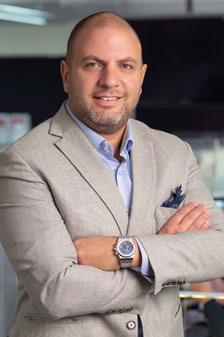
While the UAE’s zero-tax framework on income, capital gains and inheritance provides immediate fiscal benefits for HNWIs, the sustainability of this wealth transfer depends on other critical factors, such as the country’s diversified economy, political stability and progressive legislative approach.
For instance, the UAE’s projected economic growth rate of 4.5% for 2025 substantially exceeds most developed economies, providing a stable and dynamic investment environment that complements tax advantages.
This growth trajectory, supported by robust foreign direct investment (FDI) levels, creates multiplicative wealth generation opportunities that extend beyond tax optimisation strategies.
International corporations building their HQs in the UAE
Corporate positioning data shows that Dubai and Abu Dhabi rank among the top 12 global cities for business environments, highlighting the comprehensive infrastructure the UAE has built to support both individual and institutional wealth management requirements.
Earlier this year, the Dubai Chamber of Commerce published data showing an increase in foreign companies setting up in the emirate, with people coming
from Iraq, Türkiye and the UK among the nationalities topping the list.
The government agency further revealed 70,500 new companies registered in 2024, with Iraqi companies showing a 37.8% upsurge, Turkish firms recording 25.5% growth and UK startups representing a 14.2% increase with 2,588 new companies, compared to statistics in 2023.
In addition, the trading and services sector attracted 29,000 new companies, while the construction sector grew by 33% with 7,434 new firms.
The UAE’s FDI inflows also reached USD 45.6 billion in 2024, complemented by a 4% boost in total gross domestic product (GDP) and a 2.8% uptick in the number of greenfield project announcements.
Ultimately, this rise in new business activity underscores Dubai’s appeal to global talent, capital and innovation, reinforcing its role as a regional economic and investment powerhouse.
The UAE’s geographic positioning also offers unique strategic value for wealth management activities.
Located at the intersection of European, Asian and African markets, the country provides unparalleled connectivity for global investment strategies—an advantage that becomes increasingly valuable as geopolitical tensions often complicate traditional financial center relationships and create demand for neutral and accessible wealth management hubs.
Furthermore, the UAE’s golden visa program has proven to be an effective approach to attracting and retaining both talent and capital by providing long-term
ALSO
THE
residency and security, which address fundamental concerns about wealth preservation and family continuity.
In fact, national statistics show that the golden visas issued by the government more than doubled in recent years, showcasing a robust demand for longterm UAE residency pathways.
The latest figures from Dubai’s General Directorate of Residency and Foreigners Affairs show the agency issued 158,000 golden visas in 2023, nearly twice the number of golden visas released in 2022.
Another notable factor is the significant cost advantages that Dubai offers in comparison to established wealth centers such as London, New York and Hong Kong, while providing the same high quality of life, infrastructure and essential services, including education and healthcare.
The magnitude of this wealth migration suggests structural changes in our current global economic architecture rather than temporary opportunities. However, although current trends strongly favor continued wealth migration to the UAE, several factors warrant monitoring for long-term sustainability.
Global tax coordination efforts, particularly those addressing profit
shifting and minimum tax rates, could affect the UAE’s competitive positioning. Additionally, geopolitical developments in the Middle East region, though currently stable, might become variables that could influence investor sentiment.
On the other hand, the UAE’s economic diversification efforts, specifically in technology and renewable energy sectors, provide resilience against commodity price volatility that historically affected regional economies.
This diversification strategy promotes a sustainable wealth management infrastructure that is independent of traditional resource-based economic cycles.
For global investors, the UAE’s emergence as a wealth management hub creates opportunities for portfolio diversification and tax-efficient structuring. To achieve long-term success, however, they need to understand the country’s local regulatory frameworks, cultural considerations and future goals.
Financial service providers must also recognise the UAE’s growing importance and role in global wealth management and provide the right ecosystem to support this wealth transfer, or risk losing clients that now require a different suite of services to meet their changing wealth migration needs.
As the UAE aims to preserve its status as the new hub for HNWIs, family offices and conglomerates, its ability to balance economic diversification, regulatory framework and geopolitical stability will determine whether it simply captures migrating wealth or permanently restructures the global finance market.
Harjit Kang Commercial Director, MEA at Mambu discusses the rise of Islamic finance and how they are taking a lead in ensuring regional banks and financial institutions are equipped to successfully manage in this important market
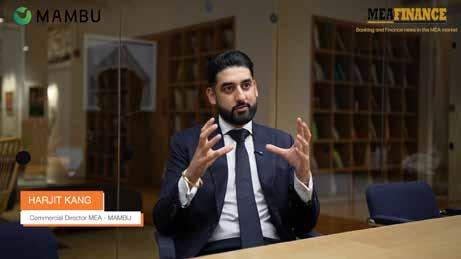
As an acknowledged leader in composable core banking technology, what distinguishes Mambu from other providers operating in our region?
You need to look at the fundamentals here. So, if you go back to the perspective of the actual founding principles of Mambu, it’s a single code base, pure SaaS provider,
which by itself is a key differentiator. On top of that, it is configuration only, so there is no customisation of the code whatsoever. However, you do adopt the speed to market benefits of it being configuration-driven. And of note, in addition to this, Mambu was the first business to ever coin the term composable banking.
So, what we mean by that is to give you the ability to leverage best of breed
components within the tech stack, rather than having to go with a legacy provider that will give you a one-stop shop, which is maybe not fit for purpose. Maybe they are not best of breed at KYC or from a UX channel perspective.
What we give the benefits of, leverage a lean core and plug in anything you want to. What that also gives the bank, is the benefit of a future-proof tech stack. Anything within that ecosystem can be replaced.
So, as we are in the market now in the GCC, and all the other providers coming in from Europe and America, there’s a plethora of modern tech that’s being developed within the region. So, if that KYC provider doesn’t work for you in three years, replace them. It’s all about giving the power back to the bank.
What areas of growth in terms of the application of technology are you currently observing in the regional banking and finance markets?
There’s many. What we’re seeing being driven by the youth in the market is they actually want to go more towards ethical banking. We’re actually now starting to see a huge growth of, let’s say, digital Islamic banks that are coming to the market.
The legacy banks, the ones that have been there for a long time, they do have the market share. However, that market share is being taken. They are actually now looking to spin off neo projects or even projects that they’re looking to go into new segments for.
For example, we’re having conversations even this week around banks looking to go into the SME segment, massively underserved. However, with their current tech stack, they can’t serve them properly. And for the SMEs, the onboarding time just takes too long.
So that’s just one example. You’ve got others that are looking to launch wallet propositions. But what we are typically seeing is the real push around ethical. And that’s not just from an Islamic Shari’ah compliance perspective, but also from the conventional side.
The Islamic banking sector is posed to exceed assets worth $4Tn. So how is Mambu positioning to help institutions best manage this growth?
When we see growth, we actually see that linked directly to technology. In my personal opinion, I believe technology enables growth.
You have to have a stable and an agile platform to enable it. You can have the best proposition in the market, but if you don’t have the fundamentals done correctly, you cannot scale, be it from launching a new product line to the market, being able to onboard your millions of customers that you want to do so. So, we’re actually enabling it from them leveraging a best of breed SaaS technology, which is built for horizontal and vertical scalability.
Also, the platform is poised to help with regional scale. We’ve seen it with many of our customers from European points of views. We’ve had customers move into 26 different markets. The technology is ready. We just need to ensure that the banks are also ready and have the right technology in place to do so.
What moves has Mambu made to help financial institutions quickly develop and scale their Shari’ah compliant products in this time of rapid market growth?
Mambu has continuous investment into the product itself. And that product is aligning to the Shari’ah principles that
we’ve seen taken to market. And you can see that with some of the recent releases we’ve taken to market.
Please provide some examples of Mambu’s upgraded capabilities for Islamic banking.
There are many, but let’s focus on a few. The first will be our profit-sharing capability. It’s a profit-sharing engine that we have created. Ultimately, what that is, it automates profit calculation and distribution.
Why is that important? First of all, it reduces operational risk. Second of all, it ensures transparency. And third of all, it guarantees compliance, which is very important with alignment to Shari’ah principles.
On top of that, Mambu, of course, is continuously evolving its product set. So, the product configuration to be from a no-code perspective, the financing
absolutely compliant and segregated from conventional banking. With Mambu, this can be achieved in multiple ways. Either you can spin a separate dedicated instance, which will be totally segregated, or we have seen some customers spin up a new tenant and that tenant has a separate database schema, which limits the amount of access of the conventional perspective. What we are trying to ensure here, there is no commingling of the two separate product sets. This can be achieved in multiple ways. It all just depends on which the bank prefers.
How can Mambu help banks operating across multiple nations manage the often-differing interpretations of Shari’ah finance in individual countries or regions?
Yeah, so what we’ve we are seeing, is there’s nuances from many jurisdictions
IT’S ALL ABOUT GIVING THE POWER BACK TO THE BANK
terms, the repayment structure, et cetera, can all be done within Mambu from a configuration perspective in alignment with a magnitude of Shari’ah compliant principles.
And of course, this all comes with the benefits of Mambu such as the quick time to market, the simplicity, et cetera.
How does Mambu’s dualbanking support maintain separation between Islamic and conventional banking to ensure Shari’ah compliance at financial institutions?
Yeah, so all Shari’ah products, the principles, the calculation, the logic associated to it, they need to be segregated to ensure that the bank is
that we operate in when it comes to Islamic banking, from KSA, for example, to Malaysia, to Indonesia. And also, actually, within each one of those individual regions, the committee, the Shari’ah committee, may have a different opinion of how the Wakala deposits should operate or the Wadiah principle should operate.
So, at the moment, we’re not seeing a standardisation. However, we do expect something like this to hopefully happen in the future, because this will really be to the benefit of the Islamic banks, because if they can standardise it, it gives them quicker time to market again, and all the other benefits of standardising your product, which is ultimately the definition of what a product is. It’s standardised.
Rajesh Nagpal Director of Technology, GBM outlines the positive changes and unavoidable necessity of APIs in our modern banking and commerce ecosystem, while highlighting the importance of also maintaining an API-first security model
In today’s fast-paced digital world, technology has made our financial interactions smoother and more intuitive than ever before. For instance, you may have easily split a dinner bill with friends using a payment app or secured a car loan online without ever visiting a bank branch. These seamless, secure financial experiences, unimaginable just a few years ago, are increasingly powered by open banking. This transformative approach allows companies and individuals to collaborate and provide innovative methods for managing their finances.
Open banking is a secure system that allows you to share your financial data, with your explicit consent, between banks and regulated third-party providers. Traditionally, your financial information
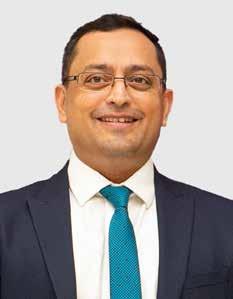
was locked within your bank. Now, using Application Programming Interfaces (APIs), that data can be securely accessed by services like budgeting apps, lending platforms or payment initiation tools. The result is more competition and innovation in the financial sector, more personalised offerings and a holistic view of your finances, all while keeping you in control of your data.
Open banking is fast becoming the global standard for how financial data is shared. Countries like the United Kingdom, which mandated open banking in 2018 for its nine largest banks, have seen the benefits of this framework in action. Other leaders include Australia, Singapore, Sweden and Germany, where open banking has supported the growth of fintech ecosystems, enhanced customer experience and improved financial inclusion.
The markets in the Middle Easter are catching up quickly as well. In the region, what began as a regulatory necessity is now a strategic enabler of innovation. Initially driven by compliance mandates from the UAE Central Bank and Saudi Arabia Monetary Authority (SAMA), open banking has evolved into a platform for digital transformation.
As Strategy& Middle East puts it, “The question ‘comply or compete?’ is obsolete.” Today, open banking is not just a regulatory checkbox but a powerful driver of digital innovation, customercentricity and ecosystem collaboration.
Through secure, scalable APIs, financial institutions are monetising data, launching premium API offerings and delivering banking-as-a-service models. Countries like Bahrain and Saudi Arabia were among the first in the region to roll out regulatory sandboxes and open banking frameworks back in 2018. The UAE is expected to introduce its Open Finance framework by 2026, further accelerating momentum.
As MEA economies become more digital-first, open banking is taking center stage as a driver of monetisation and agility. APIs are no longer just technical connectors; they are the gateways to new revenue streams and ecosystem leadership.
According to Grand View Research, the MEA open banking market was valued at USD 2.26 billion in 2024 and is projected to reach nearly USD 10 billion by 2030, growing at a CAGR of 28.3%.
To fully capitalise on open banking’s potential, MEA banks must mature their API ecosystems from basic exposure to robust platforms that enable realtime, personalised and secure financial services. To thrive in this landscape, banks must design their APIs and business models to collaborate not just with fintechs but also with telcos, retailers and even government entities.
While APIs power modern digital banking, they are also one of the most targeted threat vectors. According to reports, over 70% of internet-facing applications depend on APIs, yet many organisations lack visibility into their API inventory— especially in complex hybrid or multicloud environments.
These “API blind spots” pose real threats, leading to data breaches, fraud and regulatory penalties. In a region where digital transformation is progressing rapidly but unevenly, robust API security is paramount. Financial institutions must ensure that security and innovation should no longer be seen as opposing forces but as two sides of the same coin.
In fact, a secure API infrastructure fosters
sandboxing, version control and throttling, which are essential for rolling out safe and efficient open banking solutions.
APIs are no longer just technical tools; they are strategic assets. They enable real-time orchestration between banks, fintechs and third parties, accelerating
experimentation, speeds up innovation and builds customer trust, all while reducing breaches and simplifying compliance.
Traditional perimeter-based security models are no longer enough. What is needed is an API-first security model that can offer real-time threat detection across hybrid environments, strong identity and access controls and centralised governance and auditing.
Technology solutions providers such as Gulf Business Machines (GBM) are playing a critical role in helping banks and fintechs across the region build secure, scalable API ecosystems. A 2022 GBM survey of CIOs in the UAE, Oman and Kuwait found that more than half of the organisations surveyed had adopted a cloud-first strategy, while nearly 50% preferred a hybrid cloud approach for its balance of agility and compliance.
Many institutions in the region already operate in hybrid environments with cloud-native API stacks supporting on-premises, private and public cloud deployments with consistent security and governance. Hybrid and cloud-native environments are ideal for building secure APIs and enabling features like
product development and unlocking new revenue lines. For instance, stc pay, launched in 2018 under Saudi Arabia’s open banking framework and fueled by widespread smartphone adoption, reached a USD 1 billion valuation within two years, with over 8 million users. According to Strategy&, by offering premium APIs, banks can tap into underserved segments like SMEs, freelancers and early-stage entrepreneurs who can further harness and capitalise on the opportunities that the growing economies offer.
The MEA region is at a crucial turning point. Open banking is no longer just about meeting compliance deadlines; it is about transforming how financial services are delivered, experienced and monetised. To succeed in the API economy, banks in the MEA region must create ecosystems that are secure by design, scalable in architecture, developer-friendly and resilient in hybrid cloud environments. Financial institutions that recognise this shift and make significant investments in their API ecosystems will not only remain competitive but also help shape the future of finance in the region.
Subramanian (Subi) Kuppuswami Director & Regional Head, UK & EMEA at Maveric Systems provides valuable insights into the necessities, the benefits and the future of data-led AI in regional banking
What does “Digital Intelligence” really mean in the context of today’s financial institutions?
Digital Intelligence is the convergence of clean, connected data - both structured (such as transaction records and customer profiles) and unstructured data (like emails, social media interactions and call transcripts) with machine-driven insights to drive smarter and more informed decisionmaking across every layer of a financial institution. As this convergence deepens, so does the level of contextualisation, allowing banks to interpret data within relevant business and customer contexts, thereby unlocking richer, more actionable insights.
This contextualisation is critical in enabling banks to understand customer behaviors more precisely, detect emerging patterns with greater accuracy and respond proactively to market changes. This integrated approach not only improves operational efficiency and risk management but also empowers banks to deliver highly personalised financial products and services tailored to individual needs and circumstances.
The real shift comes when Digital Intelligence, enriched by contextual
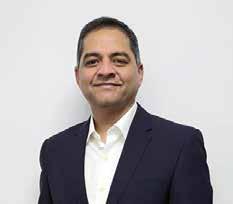
Subramanian (Subi) Kuppuswami, Director & Regional Head, UK & EMEA
understanding, is embedded into existing systems with minimal disruption, allowing banks to transform without dismantling what already works. Leveraging Digital Intelligence successfully will be critical for seamless innovation and modernisation in the banking and financial services industry.
How are banks and financial institutions adapting to this new era of data-led AI?
Financial Institutions and banks are responding dynamically and quickly to the growing demands of the financial landscape and are getting defined by their
ability to modernise data infrastructure effectively by harnessing AI to turn vast amounts of data into actionable intelligence. Those that successfully integrate AI into their data infrastructure are not only streamlining operations and reducing risk but also unlocking new revenue opportunities and transforming customer experiences.
Maveric Systems developed an advanced AI-powered Customer Support Transformation Solution for a global bank, significantly improving First Call Resolution (FCR) rates and reducing call handling time, transforming their customer service operations, driving greater operational efficiency and enhancing overall customer satisfaction.
What are the most impactful use cases of data-led AI you have seen in banking and FIs so far?
Some of the most impactful data-led AI use cases we are seeing our customers use are:
Anti Money Laundering (AML) solutions which enable banks to gain full visibility across transactions, compliance triggers and CRM touchpoints.
We are seeing use cases in fraud detection and financial crime prevention. At Maveric, we analyse real-time data to spot suspicious patterns, reducing false positives with behaviour-based models, uncovering fraud networks through graph analytics.
Elevating customer interaction and personalisation through 24/7 chatbots that deliver hyperpersonalised banking experiences.
We have enabled predictive engagement with tailored financial advice that offers seamless service via conversational AI.
Credit-risk solutions leveraging alternative data such as social behaviours that can reduce approval times while enhancing accuracy Driving operational efficiency and workflow automation, equipping relationship managers with call summarisation tools, enable task execution via agentic AI and in some cases, streamline sustainability reporting in green finance.
Reshaping wealth management through robo-advisory and automated trading to drive trades, deliver personalised investment portfolios and enable risk-managed automation across advisory services. Enhancing regulatory compliance and risk monitoring, supporting internal risk assessments to ensure explainability, transparency and consent-driven use of personal data.
What are the data challenges institutions face before AI can be truly transformative?
Most institutions still face data silos, legacy infrastructure and low data governance maturity, and many are not willing to move their data or allow it to train public large language models (LLMs). The goal is to source open market data, train the LLM, and then deploy these models at the customer›s location. The other challenge is cloud adoption. While banks use cloud for analytics and marketing data, they keep operational and transactional data on-premises. These factors are slowing down cloud adoption and scale, while also facing challenges with reducing bias and ensuring explainability with broader data sets.
To enable AI, Financial institutions and banks need to first establish a cohesive and adaptable data backbone. At Maveric Systems, we consolidate data from multiple systems via APIs and CDC mechanisms, while providing a manual interface and
rule-based workflows that align with the organisation’s regulatory hierarchy. In essence, it bridges the gap between the old and new, making AI adoption far less disruptive and more intuitive.
How should institutions measure ROI from their AI investments?
This is one of the most challenging topics for the CXOs of financial institutions. The speed at which the AI tech is evolving is making this even more challenging. In that sense, the ROI from AI driven initiatives lies in both hard and soft returns. We see successful and tangible ROI from measurable factors such as reduction in false alerts and manual case reviews, faster time to compliance and enhanced customer personalisation
IF DATA IS
high-risk cases, while using intuitive interfaces to view the entire history and data lineage associated with a particular alert or status change, as seen in Maveric’s solution. The future is not man versus machine, it is man plus machine, working in tandem.
The prevailing mantra is to keep the human in the loop, empowering individuals to make smarter and more efficient decisions rather than replacing them.
Looking ahead, what should be the AI roadmap for financial institutions in the Middle East over the next 2–3 years?
AI investments in financial institutions across the Middle East are accelerating at an unprecedented rate, yet many of them are struggling with talent shortage and technology capabilities critical for
Customer satisfaction surveys represent a valuable means of measuring ROI, as this metric is consistently monitored across industries to evaluate the quality of customer experience (CX). ROI should also capture long-term enablers like scalability, futureproofing and auditability, all of which are core to their platform design.
Where do human roles evolve in an AI-first bank, and is there a fear of redundancy?
Human traits such as ethical judgment, creativity and contextual understanding remain essential for long-term success. AI augments humans. In financial institutions, especially within compliance and risk teams, the role of people is shifting from manual execution to informed supervision. With regulatory compliance where instead of combing through thousands of transactions, officers can now rely on AI to surface
successful scaling of AI adoption. Having said that, significant investments are leading to establishing a robust foundation in talent, technology and transformative capabilities such as data modernisation. Value creation for business is what will set apart the winners in the next 2-3 years. We definitely see most of our customers looking to adopt AI.
The UAE and Saudi Arabia (KSA) are leading this transformation, where regulatory support and a strong digital vision are driving innovation and a rapid adoption of AI technologies.
What is your message to banking leaders in the Middle East embarking on this journey?
If data is the new oil, AI is the refinery but only when the pipelines are well laid out. With the right partner and architecture, you can start experiencing the AI transformation at scale today, not years down the line.

Neobanks have set about reshaping the traditional banking landscape, delivering cost-efficient models alongside highly personalised, customer-focused services and experiences, but will need to incorporate more complex products and service to keep growing
UAE neobank Wio Bank has garnered significant attention since its 2022 launch, notably for its unprecedented start with a full banking license.
The challenger bank is among a select group of digital-only banks that have successfully achieved scale and profitability amid the current volatile economic climate. With a balance sheet of over AED 37 billion as of December 31, 2024, Wio Bank has moved swiftly from new entrant to market leader.
C-Innovation Market Research’s 2024 Global Neobank Profitability Report said the challenger bank’s rapid growth underscores its ability to pair scale with
sustainable profitability, setting it apart in a sector where many digital-only banks remain in growth mode without clear earnings visibility.
The banking industry is evolving rapidly, with innovative technologies driving products and services directly into the hands of customers. Banks are also reshaping their approach to delivering greater convenience, more competitive pricing and advance customer experience.
Global consulting firm BCG said while the traditional banking system in the GCC region provides one of the highest rates of returns on equity on a global level, the advent of challenger banks or digital attackers favoured by a highly
connected population would enhance the returns generated.
Banking customers’ growing and evolving demands require banks to go beyond a product lens and create customer experiences that are datadriven, consistent across channels and complete with personalised advice.
“Products and services rendered and built on disruptive technologies are increasingly being placed in the hands of end customers, and the behaviours of banks are changing in terms of customer convenience, transparency, pricing and customer service,” said PwC.
With customer habits and expectations evolving, so too must the architecture of banking. Retail and SME banking services in this new paradigm are increasingly offered through digital channels rather than traditional branch networks.
“Neo and challenger banks have developed global banking operating models that provide an end-to-end digital capability, and multi-service and multi-product coverage as well as an advantageous cost base in comparison to incumbents’ legacy models,” said Deloitte.
Beyond their customer-centric proposition, neobanks are facing unique hurdles. Though these digital attackers typically offer a better user experience, they will need to learn to accommodate more complex products if they are to grow their customer bases and become profitable.
The global neobank market, valued at $143.3 billion in 2024, is expected to grow at a compound annual growth rate of 48.6% to reach $3.41 trillion by 2032.
With their user bases growing, GCC neobanks are diversifying revenue streams through investment and cryptocurrency trading services, premium accounts for mass-affluent customers and licensing of proprietary banking software to other financial institutions.
GCC central banks have long expressed an openness to neobanks even as regulations permitting such banks failed to materialise for many years. BCG projected that GCC’s neobank market will grow to a valuation of $3.45 billion by 2026, driven by the growth in digital payments (53%) and digital remittances (41%).
With over 45 active neobanks in the Middle East and Africa alone and global giants such as Nubank and Revolut expanding into the region, customer loyalty is becoming increasingly fragile, and the banking landscape is rapidly evolving.
UAE’s Ruya Bank is the latest neobank to join the GCC’s growing challenger bank ecosystem after it launched operations in 2024. In its first year, the shariah-compliant neobank has introduced personal banking services for retail customers, investment deposits, kids savings accounts and tailored business banking solutions, designed to meet the evolving needs of individuals and businesses in the UAE.
Digital-exclusive neobanks such as Wio Bank are already having a tremendous impact on SME and consumer finance, the digital economy and society at large. Wio became operational with the launch of its Wio Business last September.
The bank launched its retail banking proposition, Wio Personal, in August to complement its corporate banking offering. Wio Bank, which is jointly owned by Abu Dhabi’s ADQ Alpha Dhabi Holding, e& Group and First Abu Dhabi Bank, has three main business lines: digital banking apps, embedded finance and banking-asa-service solutions.
NEO- AND CHALLENGER BANKS HAVE DEVELOPED GLOBAL BANKING OPERATING MODELS THAT PROVIDE AN END-TO-END DIGITAL CAPABILITY, AND MULTI -SERVICE AND MULTI-PRODUCT COVERAGE AS WELL AS AN ADVANTAGEOUS COST BASE IN COMPARISON TO INCUMBENTS’ LEGACY MODELS.
– Deloitte
The UAE’s first digital community bank, Al Maryah Community Bank (Mbank), offers an omnichannel experience to individual consumers and small businesses. The Abu Dhabi-based digitalexclusive bank partnered with the Khalifa Fund to provide SMEs with tailor-made, convenient and secure banking and financial services while managing their financials more efficiently.
Zand Bank, another neobank in the UAE, is yet to start operations after receiving a banking license from the central bank in July 2022.
Global consulting firm Simon-Kucher & Partners said that if other markets are a good indicator of what will happen next, then the Middle East can expect more neobank competitors to appear very soon.
Though Saudi Arabia is yet to witness mainstream adoption of neobanks, the market is already showing an appetite for alternative solutions that enable banking customers to access services without stepping into brickand-mortar branches. Saudi Central Bank (SAMA) began publishing licensing requirements for digital-only banks in 2020, in line with Vision 2030 and the financial sector development programme. The kingdom currently has three licenced neobanks.
D360 Bank, a shariah-compliant neobank backed by the Public Investment Fund and Derayah Financial Company, launched operations last December. The challenger bank is targeting the first quarter of 2026 to close the Series
A funding, and the proceeds will help expand services to SMEs.
D360 Bank has more than a million users and aims to reach around four million before a potential public listing in four years.
stc Bank, the digital lender of the Saudi Telecom Company, commenced operations in January. The digital-only lender aims to roll out its full suite of services later in 2025, after getting a fresh $800 million cash injection from stc Group, its largest shareholder.
stc Bank recorded SAR345 million in gross profit in 2024 and counts Western Union as a key stakeholder.
Neobanks or challenger banks are unencumbered by the constraints of legacy business models and core systems. They leverage transparent product offerings to provide a wide range of easily accessible banking services in a platform approach that today’s digitally savvy customers expect.
To build business agility, boost innovation and enable growth, a fundamental shift is required from incumbent GCC banks – moving from inward-looking practices with rules and procedures to outward-looking engagements through partnerships and collaborations.
Retail banks in the region are leveraging their existing resources to introduce speedboats – cloud-native digital spinoffs that enable faster time-tomarket for the launching of new products and market expansion.
Mambu said in a report that a wellexecuted speedboat, often customercentric or targeting a niche segment, can be quickly scaled up according to the market requirements.
Nomo, a digital bank backed by Kuwait’s Boubyan Bank Group, partnered with Abu Dhabi Commercial Bank and Al Hilal Bank in April, giving UAE customers access to UK-based Shariah-compliant multicurrency current and savings bank accounts. The unique proposition enables customers to secure finance for purchasing properties in the UK, either as an investment or a second home.
Dubai’s Mashreq trimmed its nationwide branch network from 34 in 2019 to just 10 this year. The bank operates ‘digital spinoffs’ offerings with its consumer-facing Neo and businessfocused NeoBiz. In June, Mashreq Neo joined forces with India’s Federal Bank to facilitate digital Non-Resident Indian account opening for its customers in the UAE.
Emirates NBD launched Liv., a digitalexclusive bank for millennials, in 2017. Building on this success, the bank unveiled E20 in 2019, a digital bank that caters to the needs of small and mediumsized enterprises.
Similarly, Dubai Islamic Bank also introduced its digital spinoff rabbit in December 2021. The Shariah-compliant lender’s digital banking platform offers current accounts, globally accepted debit cards as well as payments and money transfer services.
The speedboat approach requires legacy banks to quickly develop new digital products and services that attract and delight customers. These offerings need less capital than traditional banking products and they are said to be far less expensive to support.
The GCC banking sector is at an inflexion point and the new innovative financial technologies are offering banks the potential to boost revenues at lower costs by engaging and serving customers in radically new ways using new business models.
PRODUCTS AND SERVICES RENDERED AND BUILT ON DISRUPTIVE TECHNOLOGIES ARE INCREASINGLY BEING PLACED IN THE HANDS OF END CUSTOMERS AND THE BEHAVIOURS OF BANKS ARE CHANGING IN TERMS OF CUSTOMER CONVENIENCE,
The business of banking is changing rapidly, and open banking is the perfect growth catalyst for neobanks. Traditional banks can catalyse growth by operating a range of new models in parallel with the current core of the business.
McKinsey said though several banks are adopting open-banking enablers, successful challenger banks gain a competitive advantage by building an open platform from the outset.
To become a value architect, incumbent banks should consider playing a range of roles in the value chain. Furthermore, depending on the size, market and strength of the bank, a legacy bank can embrace any mix of these approaches to increase business model flexibility and differentiate itself from the competition.
PwC said that open banking has the potential to reshape the financial services landscape and several financial centres in the emerging markets, the GCC region included, are making considerable moves in this space.
Open banking in the Gulf region exists on a spectrum, from models driven by regulators to those led by industry. SAMA unveiled its ‘Open Banking Lab’ last December as part of the Gulf state’s broader strategies to speed up the development of open banking. The ‘Lab’ constitutes a ‘technical testing environment’ to enable established banks and fintech companies the opportunity to ‘develop, test and certify’
open banking services to ensure compatibility with the framework.
Bahrain is implementing a Europeanstyle regulation-driven approach, and the UAE has adopted an Americanstyle market-driven approach under the guidance of the Abu Dhabi Global Market and Dubai Financial Services Authority.
Application Programming Interface (API), a set of communication protocols used to develop computer applications, is at the core of banks’ Open Architecture and plays a significant role in our digital strategy.
Abu Dhabi Islamic Bank (ADIB) launched its first API developer portal last June, allowing fintech developers to use the Shariah-compliant lender’s APIs. Emirates NBD also launched a ready-to-use API developer portal ‘Emirates NBD API Souq’, to provide fintech firms, developers and corporate clients an all-in-one ecosystem to build innovative financial solutions.
Open banking requires a robust, agile and scalable IT architecture to enable API integrations with multiple entities. Its implementation promises to create a new data-sharing infrastructure, which will form the basis of a much richer range of services and products across the whole of financial services.
For years, GCC regulators were perceived as cautious and slow-moving. However, the regulators are playing a pivotal role in accelerating digital banking, fast-tracking policies and frameworks to create an environment conducive to entrants and innovation-driven growth.



As the Open banking evolves into Open finance, extending beyond banks to integrate data from pensions, insurance, mortgages, mutual funds and other financial products, it is inaugurating a time where modern banks are required to become trusted, behind the scenes enablers
The financial services sector is undergoing a structural shift, underpinned by frameworks that facilitate secure and transparent data exchange – arguably the most critical asset in the modern financial ecosystem.
With customers demanding more from their banking experiences, financial institutions are enhancing their offerings to deliver more seamless and engaging experiences. Open banking and Open finance present a significant opportunity
to reshape the GCC banking landscape, mirroring the tangible benefits seen in markets where these initiatives have already been successfully implemented.
“Technology forms the bedrock of Open banking and Open finance systems, providing the infrastructure and tools necessary for secure and efficient data sharing,” said the Asian Development Bank Institute.
Open banking and Open finance are prompting banks and fintechs to reassess how customer data is shared and utilised,
enabling innovation while maintaining strict controls over privacy and security.
The GCC region is accelerating the adoption of Open banking and Open finance frameworks, driven by regulatory support, technological innovation and cross-industry collaboration.
The momentum is fuelling rapid growth in digital payments, with mobile wallets, contactless cards and QR-based transactions gaining traction – particularly in the UAE and Saudi Arabia, where authorities are actively promoting cashless economies and broader digital payment ecosystems.
However, the MENA Fintech Association notes that Open finance extends beyond the account-level data of Open banking, offering “read” access to a customer’s full financial footprint, including product details, pricing and contractual information across savings accounts, mortgages, pensions, investments and equities.
Open finance represents a stepchange, moving beyond “atomic” APIs like
payment initiation requests. It establishes a unifying framework that links products and services, enabling seamless connectivity and broader data-driven innovation across the financial ecosystem.
Meanwhile, Open finance is moving up the regulatory agenda in the GCC. Policymakers view it as a mechanism to advance financial management for households and small and medium-sized enterprises; while reshaping the way banks interact with one another and engage with customers.
Open finance in the GCC is still taking shape, with no clear sense yet of which players will emerge as leaders. Fintechs are leveraging the technology to compete for customers and capital, while incumbents are expected to remain embedded in the system – even if their role shifts away from direct client relationships.
Open banking and Open finance are gaining traction across the Gulf region, reshaping how financial institutions and customers interact.
The era of exclusive, singlebank relationships is giving way to interconnected ecosystems, where fintechs – enabled by Open finance frameworks – are rolling out differentiated and personalised financial services and products. The tech-enabled advancements are expanding customer choice while compelling incumbents to reevaluate their value propositions.
Haytham Yassine, the Managing Director & Partner at BCG, said the era of customers relying on a single bank for deposits, lending, investments and payments is over.
“Today, diversified financial relationships across multiple providers are driving the implementation of Open finance, as institutions seek to meet rising demand for seamless data sharing and integrated services,” said Yassine.
Building on Open banking, Open finance extends the model by emphasising transparency in data usage, storage and portability. The push is being driven by
– Asian Development Bank Institute
growing calls for transparency in how data is used, stored and transferred – a shift that could unlock new efficiencies and product innovations for both consumers and providers.
Though some markets initially treated Open finance primarily as a regulatory compliance exercise, similar to the European Union’s approach under PSD2, it has since evolved into a broader catalyst for innovation.
GCC regulators view the framework as a gateway to new business models, sharper customer experiences and greater operational efficiency across industries. Data from the Open Banking Tracker indicates a significant advancement in terms of bank APIs, API aggregators and third-party providers in the Middle East, compared to other emerging markets as of August 2025.
“Given the success of the Open banking market, which is projected to hit $123.7 billion by 2031, is any indication, Open finance represents a revolution within the financial services sector,” said PwC.
Open banking enables third-party access to select banking data. However, Open finance takes it further, spanning the full spectrum of financial services – from mortgages and investments to pensions and insurance – with the goal of creating a more integrated and comprehensive financial ecosystem.
Building stronger
Saudi Arabia, Bahrain and the UAE have been at the forefront of Open finance implementation in the Middle East. While the GCC region is recognised
for its progressive stance on Open banking, most countries have primarily relied on regulatory mandates to drive implementation, with the exception of the UAE.
PwC projected that Open banking has the potential to reshape the financial services landscape, and several financial centres in emerging markets, including the GCC region, are making considerable moves in this space.
Bahrain was the first to mandate open banking and the UAE and Saudi Arabia are now making moves to follow their neighbour’s example. The kingdom issued its open-banking rules in 2018, followed by a framework with guidelines on data sharing and governance in late 2020. The government is implementing a Europeanstyle regulation-driven approach.
Following the issuance of its open banking policy in January 2021, the Saudi Central Bank (SAMA) published its Open Banking Framework in November 2022, with an initial focus on account information services, to be followed in the second phase by a focus on payment initiation services.
SAMA introduced an ‘Open Banking Lab’ in December 2022 to speed up the development of open banking in Saudi Arabia. The ‘Lab’ constitutes a ‘technical testing environment’ to enable established banks and fintech companies the opportunity to ‘develop, test and certify’ open banking services to ensure compatibility with the framework.
“To succeed in Open banking, banks in Saudi Arabia and the UAE should start
thinking like platform companies, flexing their business models to connect people and processes with assets and backing that up with technology infrastructure that can manage interactions from internal and external users,” said Accenture.
The Central Bank of the UAE is spearheading a comprehensive Financial Infrastructure Transformation Programme, an ambitious initiative that encompasses nine key projects, including the establishment of Open finance platforms, with a target completion date of 2026.
Open banking platforms, powered by APIs, enable both retail and enterprise clients to access real-time consumer financial data, facilitating the secure sharing of account information and transaction history with external entities, including vendors, suppliers, business partners and other banks.
The financial landscape is undergoing a profound transformation, with Open banking rapidly morphing into Open finance. The evolution is not just a technological shift, but a fundamental re-evaluation of how financial services are delivered and consumed.
The checking and current account, long the foundational asset of the depositbearing bank, is no longer sufficient on its own. Its value will increasingly be defined by the rich utility services and bespoke offerings built around it, which anticipate and fulfil customer needs beyond simple transactions.
The true strategic frontier lies in the first layer of Open finance, where consumer data, accessed via secure APIs, becomes the catalyst for innovation. The shift is transforming the traditional Know Your Customer (KYC) model. Instead of merely verifying identities, banks must pivot to ‘Understanding Your Customer’, leveraging data to personalise experiences and deepen relationships.
The vision of a shared KYC utility, potentially backed by a national identity platform, is not a distant fantasy but a
GIVEN THE SUCCESS OF THE OPEN BANKING MARKET, WHICH IS PROJECTED TO HIT $123.7 BILLION BY 2031, IS ANY INDICATION, OPEN FINANCE REPRESENTS A REVOLUTION WITHIN THE FINANCIAL SERVICES SECTOR
logical next step to streamline operations and free up resources for value creation.
The implications for lending are equally profound. The rise of credit-as-aservice signals a move away from static, historical credit scores toward dynamic assessments based on real-time cash flow. For a bank, this means a more accurate and nuanced understanding of a borrower’s actual ability to pay, as opposed to their historical willingness to pay.
With the rise of Buy-Now, pay-later (BNPL) and micro-lending, the granular data empowers more informed and responsible lending decisions, opens new markets and reduces risk in alternative lending products. This is a strategic opportunity to modernise the loan book and improve customer outcomes.
“Open data solutions have fuelled the expansion of BNPL services, allowing consumers to split payments into interest-free instalments, making highvalue purchases more accessible,” PwC said, adding that BNPL providers use APIs to access detailed transactional data, enabling better customer credit and risk assessments.
The payments domain, long a fortress for card networks and bank-to-bank transfers, is also under siege. Open finance enables account-to-account payments at the point of sale, directly challenging the interchange fees that have long been a significant revenue stream.
BCG strategists said innovations such as the Dutch payments system, iDEAL, demonstrate that this model is not only viable but can create a more seamless
and cost-effective payment experience for both merchants and consumers.
For banks, this necessitates a proactive re-evaluation of their payment strategies, moving from a fee-based model to one that creates value through efficient, embedded solutions.
Going forward, the proliferation of embedded finance represents a significant competitive threat and a powerful partnership opportunity. Non-financial institutions, from ride-sharing companies to retailers, are integrating banking services directly into their apps, capturing the customer experience at a deeper level.
“Open banking payments can play a pivotal role in the realm of embedded payments, offering substantial benefits that streamline and enhance the consumer experience across various platforms,” according to the Asian Development Bank Institute.
Banks that cling to a standalone appcentric model risk becoming invisible. The strategic imperative is to become a trusted, behind-the-scenes enabler, providing the core banking-as-a-service infrastructure that powers these new ecosystems. The democratisation of banking is underway, and success will hinge on a bank’s ability to become a versatile and indispensable partner in this new financial landscape.
Global Open finance adoption must occur responsibly, with robust strategies for data protection and the integration of systemic API security. Leaders who prioritise trust, resilience and customercentric innovation will unlock massive market potential.
